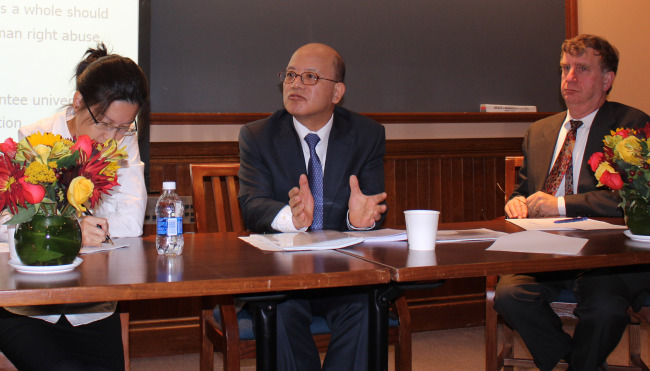Court chief sees no limit in punishing Japanese sex slavery
By Korea HeraldPublished : Oct. 30, 2013 - 19:07

President of the Constitutional Court Park Han-chul has criticized the Japanese government sharply for denying the historical fact that its military had forced women into sexual slavery during World War II.
His remarks came in a special lecture he gave at Harvard Law School in Cambridge, Massachusetts, Tuesday.
Park is the first president of the Constitutional Court of Korea to have given a lecture at the school.
In the lecture, titled the “State’s duty to protect women from human rights violation,” he noted that Japan has taken no action to pay damages to former comfort women for the past 20 years, since Chief Cabinet Secretary Yohei Kono issued a statement in 1993 admitting to the involvement of the Japanese military in the forced drafting of comfort women.
“Furthermore, some (Japanese) government officials still deny the existence of the draft system despite numerous convincing pieces of evidence, even claiming that the Kono statement should be revised,” Park said.
He elaborated on a comfort women case, held in court in 2011, that ruled it unconstitutional for the Korean government not to take action to resolve the dispute over the rights of former comfort women against Japan. The case was related to the agreement on the settlement of claims between Korea and Japan, which was executed in 1965.
After the ruling, the Ministry of Foreign Affairs of Korea sent diplomatic documents twice to Japan, proposing “bilateral talks for dispute resolution,” but the government of Japan has made no meaningful replies to settle the issue, he said.
The issue of comfort women had never been discussed until the 1990s after a press conference held by former comfort women.
Park said that the international community is openly criticizing the Japanese government’s passive stance on the issue, since it is crucial to proclaim that forcing women into sexual slavery for the military is a heinous crime that should never be tolerated by humanity.
He cited an example of Germany.
“Unlike Japan, Germany took a clear position to acknowledge the human right violations committed during World War II by Nazi Germany, extended a national apology to the victims and provided monetary reparations.”
He also noted that U.N. General Assembly Resolution No. 2391 from 1968 clearly stated that in war crimes and crimes against humanity cases, statutes of limitations are not applicable.
“At present, there are 56 surviving former comfort women in Korea, and they are all advanced in years. And this is one of the reasons why Japan has to pay promptly for damages done and make sincere apologies to them.”
His special lecture came upon the request of Harvard Law School dean Martha Minow who visited the court in May.
By Chun Sung-woo (swchun@heraldcorp.com)
His remarks came in a special lecture he gave at Harvard Law School in Cambridge, Massachusetts, Tuesday.
Park is the first president of the Constitutional Court of Korea to have given a lecture at the school.
In the lecture, titled the “State’s duty to protect women from human rights violation,” he noted that Japan has taken no action to pay damages to former comfort women for the past 20 years, since Chief Cabinet Secretary Yohei Kono issued a statement in 1993 admitting to the involvement of the Japanese military in the forced drafting of comfort women.
“Furthermore, some (Japanese) government officials still deny the existence of the draft system despite numerous convincing pieces of evidence, even claiming that the Kono statement should be revised,” Park said.
He elaborated on a comfort women case, held in court in 2011, that ruled it unconstitutional for the Korean government not to take action to resolve the dispute over the rights of former comfort women against Japan. The case was related to the agreement on the settlement of claims between Korea and Japan, which was executed in 1965.
After the ruling, the Ministry of Foreign Affairs of Korea sent diplomatic documents twice to Japan, proposing “bilateral talks for dispute resolution,” but the government of Japan has made no meaningful replies to settle the issue, he said.
The issue of comfort women had never been discussed until the 1990s after a press conference held by former comfort women.
Park said that the international community is openly criticizing the Japanese government’s passive stance on the issue, since it is crucial to proclaim that forcing women into sexual slavery for the military is a heinous crime that should never be tolerated by humanity.
He cited an example of Germany.
“Unlike Japan, Germany took a clear position to acknowledge the human right violations committed during World War II by Nazi Germany, extended a national apology to the victims and provided monetary reparations.”
He also noted that U.N. General Assembly Resolution No. 2391 from 1968 clearly stated that in war crimes and crimes against humanity cases, statutes of limitations are not applicable.
“At present, there are 56 surviving former comfort women in Korea, and they are all advanced in years. And this is one of the reasons why Japan has to pay promptly for damages done and make sincere apologies to them.”
His special lecture came upon the request of Harvard Law School dean Martha Minow who visited the court in May.
By Chun Sung-woo (swchun@heraldcorp.com)
-
Articles by Korea Herald




![[Herald Interview] 'Amid aging population, Korea to invite more young professionals from overseas'](http://res.heraldm.com/phpwas/restmb_idxmake.php?idx=644&simg=/content/image/2024/04/24/20240424050844_0.jpg&u=20240424200058)













![[KH Explains] Korean shipbuilding stocks rally: Real growth or bubble?](http://res.heraldm.com/phpwas/restmb_idxmake.php?idx=652&simg=/content/image/2024/04/25/20240425050656_0.jpg&u=)

